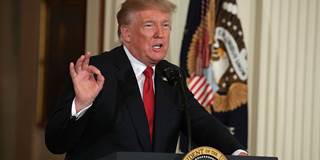Dealing with an ambitious and powerful Iran entails a broad range of open-ended challenges that define the ever-turbulent Middle East. Without the 2015 nuclear deal, however, those challenges are likely to become even more daunting.
NEW YORK – US President Donald Trump has announced what was long anticipated: that he will not certify that Iran is complying with the July 2015 “Joint Comprehensive Plan of Action” (JCPOA) signed by the United States, China, Russia, France, Germany, the United Kingdom, and Iran. Nor will he certify that the suspension of sanctions undertaken by the US as part of the agreement is justified and in the vital national interest of the US.
To be clear, such certifications are not required by the JCPOA. Rather, they are required every 90 days by a law enacted by the US Congress soon after the accord was signed. It is also essential to underscore that Trump did not withdraw from the JCPOA itself. What he chose was a compromise: to make clear his disdain for the agreement without leaving it or reintroducing sanctions that were removed as part of it (a step that would be tantamount to US withdrawal).
What happens next is unclear. Congress has 60 days to reintroduce some or all of the suspended sanctions but is unlikely to do so. It might, however, introduce new sanctions tied to Iran’s behavior in Syria or elsewhere in the region. Consistent with this, Trump announced his intention to place extra sanctions on Iran’s Islamic Revolutionary Guard Corps.

NEW YORK – US President Donald Trump has announced what was long anticipated: that he will not certify that Iran is complying with the July 2015 “Joint Comprehensive Plan of Action” (JCPOA) signed by the United States, China, Russia, France, Germany, the United Kingdom, and Iran. Nor will he certify that the suspension of sanctions undertaken by the US as part of the agreement is justified and in the vital national interest of the US.
To be clear, such certifications are not required by the JCPOA. Rather, they are required every 90 days by a law enacted by the US Congress soon after the accord was signed. It is also essential to underscore that Trump did not withdraw from the JCPOA itself. What he chose was a compromise: to make clear his disdain for the agreement without leaving it or reintroducing sanctions that were removed as part of it (a step that would be tantamount to US withdrawal).
What happens next is unclear. Congress has 60 days to reintroduce some or all of the suspended sanctions but is unlikely to do so. It might, however, introduce new sanctions tied to Iran’s behavior in Syria or elsewhere in the region. Consistent with this, Trump announced his intention to place extra sanctions on Iran’s Islamic Revolutionary Guard Corps.